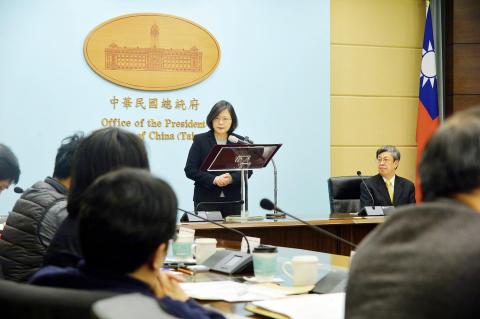Adults, not students, are at fault for a Nazi cosplay incident on Friday last week, President Tsai Ing-wen (蔡英文) said yesterday, adding that it was the result of the nation’s “superficial” human rights education and failure to teach young people about state repression of rights in the past.
Tsai made the remarks at the 25th meeting of the Presidential Office’s Human Rights Advisory Committee yesterday afternoon, urging Taiwanese to make an effort to let the nation’s human rights freedoms set the bar for other nations.
Since the cosplay event, students and school authorities at Hsinchu Kuang Fu High School have received an outpouring of criticism, with the former accused of ignorance and the latter of negligence.

Photo: CNA
The event also drew ire from the representative offices of Israel and Germany. The school’s principal, Cheng Hsiao-ming (程曉銘), resigned on Sunday.
“Human rights are universal values, but they can only be realized when we constantly put them into practice at the local level,” Tsai said.
Speaking about the criticism of the students who dressed as Nazis at the school cosply event, Tsai said that it is adults who are to blame, not the students.
“This happened because our human rights education has only scratched the surface. We neglect incidents of discrimination and prejudice in our daily lives, and we have failed to teach our young people what they should learn from history and state repression of human rights,” Tsai said.
Self-reflection is required of everyone, Tsai said, adding that the event underscores the imperative need to reinforce human rights education and incorporate issues related to rights in different subjects.
The president said the day when one can call the education system a success is the day when the nation’s students understand the suffering others have endured, respect each other’s rights and stand up for justice.
To fulfill that goal, Tsai said she would invite the Executive Yuan and government agencies to deliver a report to the committee on the nation’s human rights education.
Taiwanese regarded democracy and freedom as the most valuable of human rights during the nation’s authoritarian period, Tsai said.
“Because of the sacrifices made by many of our democratic forebears, we are able to enjoy a mature democratic political system today and see our freedom of speech protected by the Constitution,” Tsai said.
However, there is no end to the pursuit of human rights, Tsai said.
“When it comes to human rights standards, we should always look upward to learn. As a matter of fact, there is still much room for us to make improvement,” she said.

DAREDEVIL: Honnold said it had always been a dream of his to climb Taipei 101, while a Netflix producer said the skyscraper was ‘a real icon of this country’ US climber Alex Honnold yesterday took on Taiwan’s tallest building, becoming the first person to scale Taipei 101 without a rope, harness or safety net. Hundreds of spectators gathered at the base of the 101-story skyscraper to watch Honnold, 40, embark on his daredevil feat, which was also broadcast live on Netflix. Dressed in a red T-shirt and yellow custom-made climbing shoes, Honnold swiftly moved up the southeast face of the glass and steel building. At one point, he stepped onto a platform midway up to wave down at fans and onlookers who were taking photos. People watching from inside

A Vietnamese migrant worker yesterday won NT$12 million (US$379,627) on a Lunar New Year scratch card in Kaohsiung as part of Taiwan Lottery Co’s (台灣彩券) “NT$12 Million Grand Fortune” (1200萬大吉利) game. The man was the first top-prize winner of the new game launched on Jan. 6 to mark the Lunar New Year. Three Vietnamese migrant workers visited a Taiwan Lottery shop on Xinyue Street in Kaohsiung’s Gangshan District (崗山), a store representative said. The player bought multiple tickets and, after winning nothing, held the final lottery ticket in one hand and rubbed the store’s statue of the Maitreya Buddha’s belly with the other,

‘COMMITTED TO DETERRENCE’: Washington would stand by its allies, but it can only help as much as countries help themselves, Raymond Greene said The US is committed to deterrence in the first island chain, but it should not bear the burden alone, as “freedom is not free,” American Institute in Taiwan Director Raymond Greene said in a speech at the Institute for National Defense and Security Research’s “Strengthening Resilience: Defense as the Engine of Development” seminar in Taipei yesterday. In the speech, titled “Investing Together and a Secure and Prosperous Future,” Greene highlighted the contributions of US President Donald Trump’s administration to Taiwan’s defense efforts, including the establishment of supply chains for drones and autonomous systems, offers of security assistance and the expansion of

STREAMLINED: The dedicated funding would allow the US to transfer equipment to Taiwan when needed and order upgraded replacements for stockpiles, a source said The US House of Representatives on Thursday passed a defense appropriations bill totaling US$838.7 billion, of which US$1 billion is to be allocated to reinforcing security cooperation with Taiwan and US$150 million to replace defense articles provided to the nation. These are part of the Consolidated Appropriation Act, which the US House yesterday passed with 341 votes in favor and 88 against. The act must be passed by the US Senate before Friday next week to avoid another government shutdown. The US House Committee on Appropriations on Monday unveiled the act, saying that it allocates US$1 billion for the Taiwan Security Cooperation Initiative